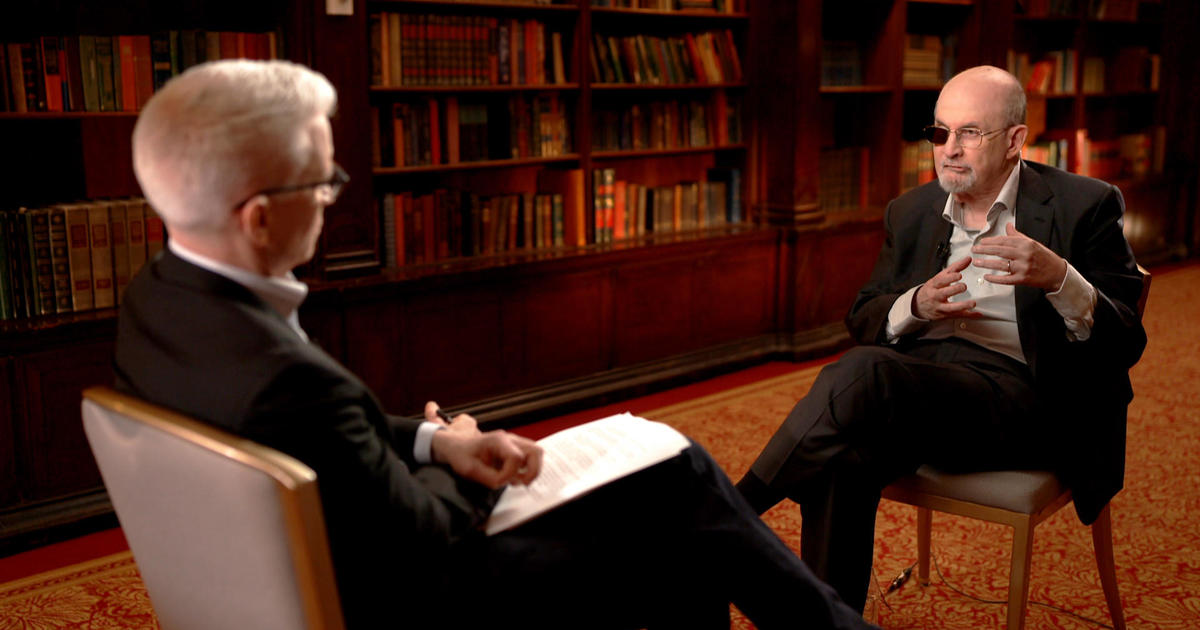Salman Rushdie on censorship in America today
Censorship in America today comes from both the left and the right, Salman Rushdie told 60 Minutes in his first major television interview since he was attacked at a literary festival in 2022. The writer spoke out ahead of the publication this week of his new book, "Knife," a deeply personal exploration of his near-death experience.
"There seems to be a kind of growing orthodoxy, particularly amongst young people, that censorship … is a good thing," Rushdie told correspondent Anderson Cooper.
The acclaimed author said the attack on free expression today comes from different directions. Previously, he explained, conservative voices were the ones calling for books to be banned, including those that discuss the role race has played in history. But now, according to Rushdie, people on the left are just as likely to call for limits on free speech.
"The thing that's different now is that it's also coming from progressive voices," he said. "There are progressive voices saying that certain kinds of speech should be not permitted because it offends against this or that vulnerable group."
Rushdie said that when speech is suppressed, the people who are first impacted are often minority groups.
"To support censorship in theory on behalf of vulnerable groups is a very slippery slope," Rushdie said. "It can lead to the opposite of what you want."
Censorship is a subject the acclaimed novelist knows well. In 1989, Iran's leader Ayatollah Khomeini issued a fatwa, a religious decree, against Rushdie that ordered all Muslims to kill him. The controversy stemmed from his novel "The Satanic Verses," which depicted a representation of a character likened to the Prophet Muhammed that the Ayatollah deemed "blasphemous."
In 1990, 60 Minutes correspondent Mike Wallace traveled to a secret location in London to speak with Rushdie, who was living in hiding. At the time, Rushdie was optimistic he could reconcile with his critics.
"In this country I don't believe that there are very many people, actually, who are seriously interested in doing me any harm," Rushdie said at the time. "I don't believe that's so in the United States, either."
Despite his optimism, he would remain in hiding for almost nine more years after that interview.
In 1998, the Iranian regime said they no longer supported the fatwa to kill Rushdie, but threats against the author continued.
On an August day almost two years ago, Rushdie was on stage at a literary festival in Chautauqua, New York, preparing to speak about the importance of protecting writers whose lives are under threat. A man with a knife rushed the stage and stabbed him multiple times in his face, neck, chest, and torso.
The attacker was a 24-year-old Muslim man from New Jersey who said he'd only read a couple pages of "The Satanic Verses" and saw a few clips of the author on YouTube. But that was enough for him to feel that Rushdie had "attacked Islam."
In his interview with 60 Minutes, the author said there is value in hearing from voices that offend because they challenge people.
"There's now a kind of offense industry," Rushdie explained. "Offense has become an aspect of identity politics. And my view is it's very easy for a book to stop offending you. You just shut it."
At his core, Rushdie is a writer. He says he's disheartened by people who only know him from the threats to his life—not his lifetime of telling stories.
"My desire to be a writer was entirely to do with the love of the power of the imagination, of imagining worlds, creating worlds for readers to inhabit and for their imaginations to engage with," he said. "And I wish that they weren't obscured by the shadow of this kind of event."
Had the attack on his life been successful, Rushdie said being a writer is how he would want to be remembered.
"I have the shelf of books," he said. "That's what I want people to look at. And hopefully a few of them might last."
The video above was produced by Brit McCandless Farmer and edited by Scott Rosann.
Brit McCandless Farmer is a digital producer for 60 Minutes, where her work has been recognized by the Webby, Gracie, and Telly Awards. Previously, Brit worked at the CBS Weekend Evening News, CBS This Morning, CNN, and ABC News.
